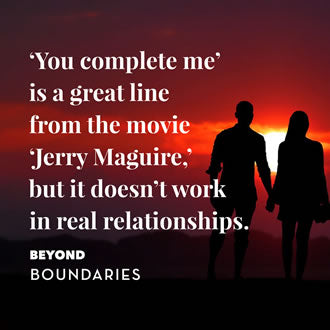
Unhealed relational wounds drive us to compulsive attempts to repair the damage. That is, without being aware of it, we seek out people we believe can "fix" what's wrong with us or help us find a piece of ourselves we feel is missing. We function emotionally like the starving man who looks in a dumpster and sees lunch instead of garbage. His perception is so driven by his need that he is willing to eat something that might make him sick.
Though we may not be aware of it, something in us wants completeness. God has "set eternity in the human heart" (Ecclesiastes 3:11), and we long for him and the full life he promises. But if we remain unaware of the powerful forces at work within us, such as our family dynamic and how we responded to it, we can be blind to its influence and seek out the completeness we lack by making all the wrong choices. For example, consider the following scenarios:
- The overly nice person lacks assertiveness and the ability to confront, so he attracts controlling and aggressive people.
- The overly angry person can't allow herself to feel helpless or sad, so she finds empathic people who won't confront her moods.
- The rigid, black-and-white person is not able to let go of control, so he seeks out spontaneous, creative people who won't try to control him.
- The over-responsible, guilt-ridden person lacks self-care, so she finds self-absorbed people who care for no one but themselves.
Of course, the problem is that these kinds of responses do not reflect God's intentions for us. And they don't lead to healthy or fulfilling connections.
These missing pieces are part of what is called the "internalization process." We become who we are by incorporating experiences that we have with other people. On a developmental level, kids come into this life incomplete. In the process of healthy development, they receive safety and acceptance and develop assertiveness, self-control, and self-care that prepare them for life on their own. Once internalization is complete, we become functioning adults who are called to pursue wholeness; or, in Jesus' words, "What I'm saying is, Grow up. You're kingdom subjects. Now live like it. Live out your God-created identity" (Matthew 5:48).
What Jesus means is that he wants us to be mature and complete. But we are not complete. We have missing pieces—soul holes we carry from childhood into adulthood. The path to completeness or wholeness is to find a relational context, such as a healthy church, small group, mentor, or therapist, who can help us finish the emotional work that enables us to grow into the capacities we lack and become who we are meant to be.
This is especially important in romantic relationships, where there is often a glitch in our emotional hardware. We feel strongly that the other person will complete us, but not in the way I am describing. It is not about becoming more connected, intimate, assertive, or real. It is about being in the presence of someone else who has those attributes without having to take responsibility to learn them.
"You complete me" is a great line from the movie, "Jerry Maguire," but it doesn't work in real relationships. You can't outsource health. You must learn it all and take it inside your skin. Complete people then attract other complete people. That is why most of us need to put less energy into romance and more into personal growth. It pays off later in romance.
Understanding your missing pieces also pays off in other ways. Perhaps your concern isn't about a marriage or dating relationship. It may be that the difficult relationship you need to address is with your parents, siblings, or a person from your childhood. Or it's about a work relationship. Whatever your interest, you will find great benefit, in looking at the missing pieces, to understanding why things ended up like they did. The more information, the better for you.
Don't let unhealed relational wounds or the pain of a past relationship affect your future. You can prevent the past from repeating itself. Read Beyond Boundaries to discover how to tell who you can trust, when the time is right to be vulnerable, and learn the keys to identify a healthy relationship. Learn More
➡️ FREE! Get The 10 Laws of Boundaries eBook when you subscribe to the Boundaries Weekly email newsletter. Learn More
